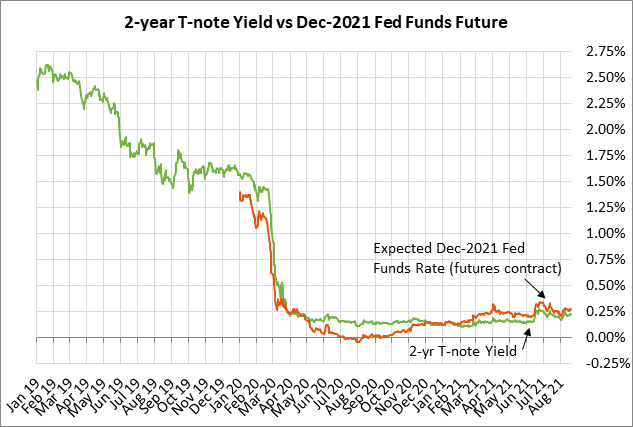- Pelosi tries to push budget resolution through House
- Pfizer vaccine approval raises hopes for more vaccinations and earlier herd immunity
- U.S. new home sales expected to stabilize
- 2-year T-note auction to yield near 0.22%
Pelosi tries to push budget resolution through House — House Speaker Pelosi on Monday evening was engaged in high-stakes negotiations with a group of nine moderate Democratic House members who demanded a vote on the $550 billion bipartisan infrastructure bill before they would agree to support the Democrat’s $3.5 trillion budget resolution.
Ms. Pelosi was trying to find a way to get those nine moderate Democratic House members on board with her plan to pass the $3.5 trillion budget resolution by today, and leave the infrastructure bill until autumn when the House can be assured that the Senate will pass the $3.5 trillion budget reconciliation bill.
The majority of the Democratic caucus fears the Senate will not pass the $3.5 trillion reconciliation bill if the House has already approved the infrastructure bill and granted moderate Democratic Senators Manchin and Sinema much of what they want. Ms. Pelosi is therefore holding the infrastructure bill hostage until Senate Democrats pass the reconciliation bill.
After the House is done voting this week, they will resume their recess and will not return to Washington until September 20.
Pfizer vaccine approval raises hopes for more vaccinations and earlier herd immunity — Herd immunity will eventually arrive in the U.S., regardless of vaccinations, after enough vaccine refuseniks catch Covid and achieve some level of immunity.
However, that day may arrive sooner due to expectations that more businesses, schools, and government entities will start making vaccinations mandatory after the Pfizer-BioNTech Covid vaccine yesterday received full approval from the FDA for people 16 and older. The vaccine previously had only an emergency use authorization. Organizations that want to require vaccinations now stand on stronger ground since the FDA has given the vaccine full approval. Moderna is expected to get its full-use authorization soon.
Bloomberg reports that an average of 889,158 vaccine doses per day were given in the U.S. over the past week. That is substantially higher than levels of around 500,000 seen before the delta variant arrived and caused the resurgence of the pandemic. The markets will be closely watching the vaccination rate over the next few weeks to see if there is a further increase in vaccinations, which would bring herd immunity closer and end the pandemic.
New U.S. Covid infections are still rising, but at least at a slower rate, raising some hopes that a peak may be near. The 7-day average of new U.S. Covid infections on Saturday rose to a new 6-1/2 month high of 148,383, but then eased slightly to 148,351 on Sunday. The slower rate of new infections can be seen by the fact that Sunday’s average infection level was up by only +14.4% from the week earlier-level, which was a far slower week-on-week rise than recent levels of +30% and above.
Still, the daily infection rate has risen to more than half of January’s record high of 251,058, even though about half of the total U.S. population is fully vaccinated. That illustrates the dangerous transmissibility of the delta variant and the difficulty the U.S. is having bringing the pandemic under control. The CDC reports that 51.5% of the total U.S. population is now fully vaccinated and 60.7% have received at least one dose.
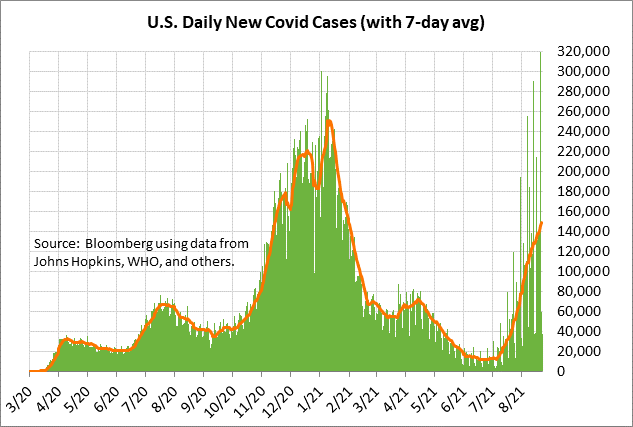
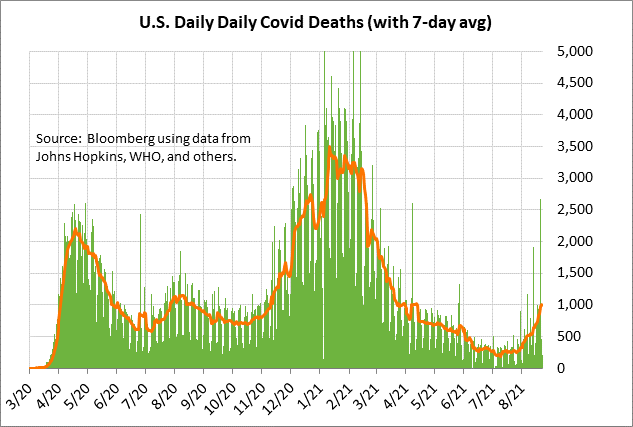
U.S. new home sales expected to stabilize — The consensus is for today’s July new home sales report to show an increase of +3.1% m/m to 697,000, regaining about half of June’s -6.6% decline to 676,000. Over the past five months, new home sales have plunged by a total of -32% from January’s 14-1/2 year high of 993,000 units and are only mildly above pre-pandemic levels.
Most of that sharp decline has been due to the low inventory of homes available on the market. Also, new home prices have soared in recent months due to high demand and low supply, thus deterring some potential new home buyers.
However, new home sales are now expected to recover slightly as more homes come onto the market. In June, there were 6.3 months worth of new homes on the market, which was sharply higher than the 3.5 record low seen last August. New home sales should also see support from the continued low level of mortgage rates. The 30-year mortgage rate is currently at 2.86%, which is 88 bp below the pre-pandemic level of 3.74% seen at the end of 2019.
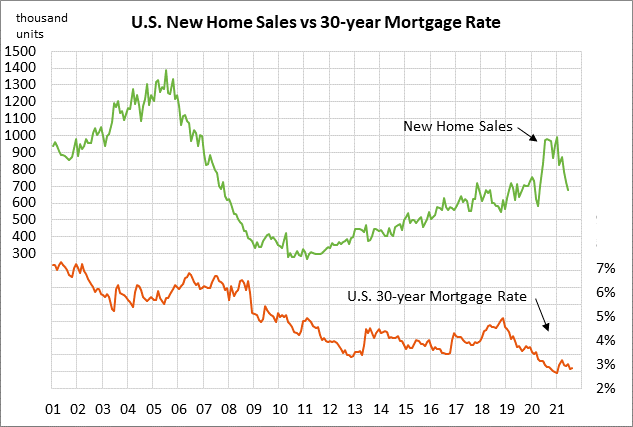
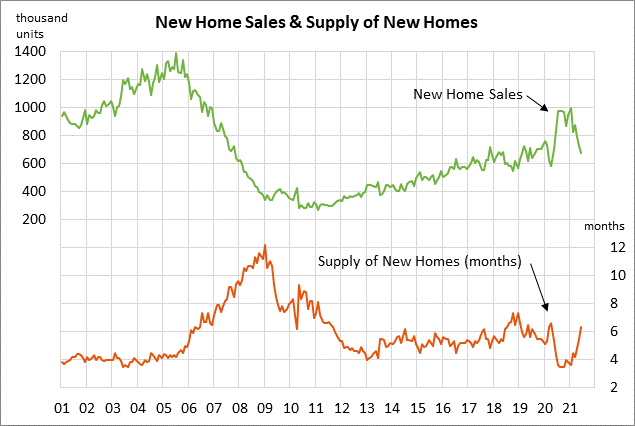
2-year T-note auction to yield near 0.22% — The Treasury today will sell $60 billion of 2-year T-notes. The Treasury will then continue this week’s $209 billion T-note package by selling $26 billion of floating-rate notes and $61 billion of 5-year T-notes on Wednesday, and $62 billion of 7-year T-notes on Thursday. The benchmark 2-year T-note yield yesterday closed at 0.22%, which is near the middle of the pandemic range. The 2-year T-note yield remains locked at a very low level since the Fed is not expected to begin raising interest rates until early 2023.
The 12-auction averages for the 2-year are as follows: 2.54 bid cover ratio, $111 million in non-competitive bids, 3.1 bp tail to the median yield, 9.9 bp tail to the low yield, and 51% taken at the high yield. The 2-year T-note is the second least popular security among foreign investors and central banks behind the 3-year. Indirect bidders, a proxy for foreign buyers, have taken an average of 52.2% of the last twelve 2-year T-note auctions, which is well below the median of 62.2% for all recent Treasury coupon auctions.
